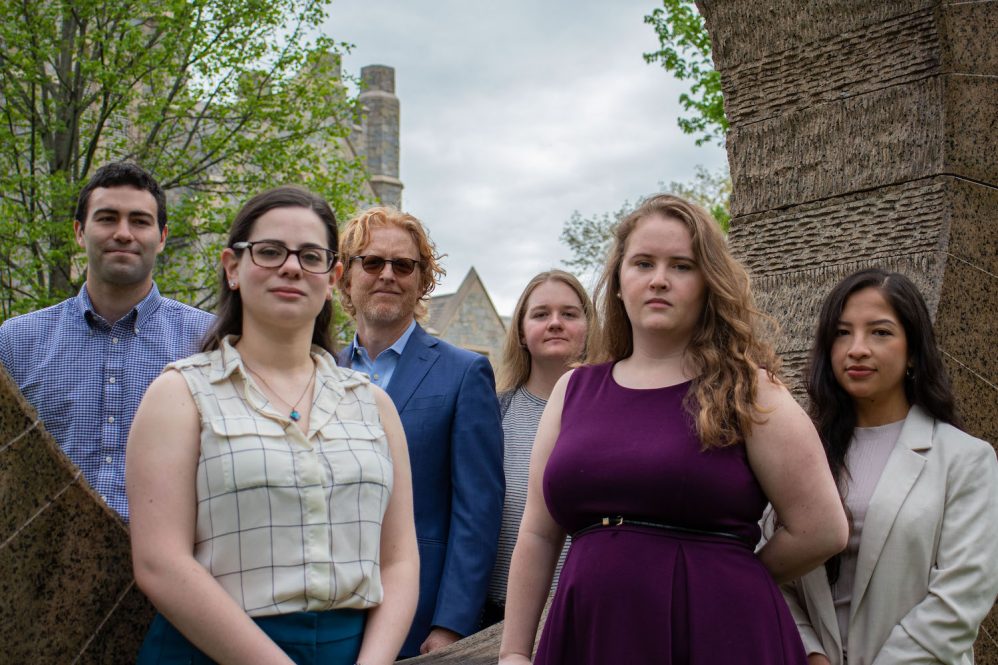A small group of UConn Law students has provided critical research and recommendations on how Connecticut can respond to a rising tide of hate crimes. Their work is already showing results.
Associate Dean Richard Ashby Wilson, a member of the Connecticut Hate Crimes Advisory Council, recruited the students to help the council draft a report and recommendations to contend with hate crimes. Working in a practicum that Wilson created, the students broke into small groups to research and analyze issues assigned to the council’s subcommittees. The students read the latest research, interviewed experts from around the world, developed proposals and created detailed briefs for the subcommittees.
The council is now working with the students’ findings to produce a report, due this fall, with final recommendations to Gov. Ned Lamont and the state legislature. This week, Lamont signed a bill with the council’s support to create a Hate Crimes Investigation Unit in the Division of State Police, and formulate a state-wide hate crimes policy and reporting protocol for law enforcement, which anticipates some of the students’ recommendations.
The legislature passed the bill on May 10, just four days before a racially motivated mass shooting in Buffalo brought the intensifying problem of hate crimes to the forefront of the nation’s attention once again.
“Hate crimes are on the rise and are likely to increase even further as we enter an election cycle, so we need to be prepared with more effective measures to prevent and investigate crimes motivated by bias or bigotry,” Wilson says. “Currently, more than 50 percent of hate crimes are not reported, and we cannot make evidence-based policy without reliable data.”
Wilson, an expert in the law of incitement, hate speech and hate crimes, taught the practicum with Judge Douglas Lavine ’77 JD of the Connecticut Appellate Court. Lavine, who co-chairs the advisory council with Amy Lin Myerson ’94 JD, credited Wilson for the “inspired idea” of creating the practicum.
“I have no doubt that we would have made only marginal progress without the efforts of Richard and the students he selected for the course,” Lavine wrote in a letter to Dean Eboni S. Nelson. The students, he added, were exemplary, among the best he has encountered at any law school.
“The students performed at a very, very high level,” Lavine wrote. “Their work product has laid the groundwork for what I am sure will be a detailed, rich and thoughtful report.”
Luke Reynolds ’22 JD, says the practicum was “an incredible experience.” He and Devon Fray ’22 JD produced a report on hate crime sentencing and restitution.
“Throughout the semester I was able to hone my legal research and analysis skills to create the legal brief that we submitted,” Reynolds says. “I read reports about hate crimes, I read reports about hate crime sentencing and restitution, and I spoke with the world’s leading experts on hate crimes.”
Laura David ’22 JD, who reported on law enforcement and hate crimes with Abby Willauer ’22 JD, found the practicum “exciting and impactful. Exciting because we were given leeway to research and take our recommendations for our subcommittee in the way we saw fit. Impactful because hate crimes are a pressing issue, and it was a great experience to be a part of the forthcoming change.”
Rebecca Oestreicher ’23 and Sofia Rodriguez, an undergraduate studying public policy, reported on the community impact of hate crimes. Hallie Tingstad ’22 JD and Sebastian Ullman ’23 JD wrote a brief on how to improve the underreporting of hate crimes and analyze the data to inform policy.
“The students’ work in the practicum advanced in a number of important ways the council’s efforts to comprehend and combat hate crimes in the United States,” Wilson says. “Their contributions have the potential to drive lasting and meaningful change.”
Preliminary recommendations derived from the students’ work include a standardized statewide system for reporting hate crimes, uniform procedures for dealing with hate crimes in public schools and new diversionary and alternative sentencing programs.
“This type of collaborative partnership is vitally important to UConn Law’s mission, which is not only to give our students educational opportunities that transform their lives and careers, but also to provide impactful service to the people of Connecticut,” Nelson says.



